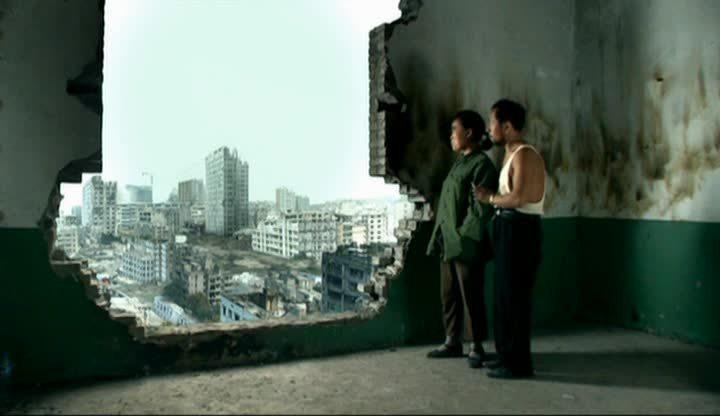
Still Life is director Jia Zhangke’s meditation on the effects—personal, societal, and environmental—that occur during the building of the magnificent Three Gorges Dam across the Yangtze River in central China. As the dam moves closer to completion, authorities hold back more and more water, meaning that low-lying communities close to the dam will soon be underwater. Therefore, the government has undertaken a massive “deconstruction” project in these communities, moving people out and tearing down old buildings and ancient neighborhoods.
The beautiful setting amidst a lush, green valley contrasts strongly with the piles of gray rubble scattered throughout the area. And this contrast in the physical world mirrors the contrasts taking place in the two stories Jia weaves together throughout the film: change and stasis, breaking down and putting back together, life and death.
These two stories, simple in their conception and careful in the way they reveal themselves, depict a man and a woman looking for their respective spouses. Neither couple has been together in years. The reasons for leaving remain unclear for most of the film, yet we know that each of these people wants nothing more than to find that spouse—for what, we can only presume.
That Jia allows these stories to develop slowly and makes close observation of their mostly fruitless searching imbues each character with a humanity that rings true. We know these people, or at least people like them—people with hopes and regrets, foibles and virtues. And as the events unfold, as the characters move ever closer to their respective goals, Jia records moments of such purity and poetry that the film strikes at the deepest chords of what it means to be human, summing up the film’s themes and ideas in images that bring contrasts together: out of rubble grows hope; out of death springs life.
—John Adair (for 2011 list)
- Directed by: Zhangke Jia
- Produced by:
- Written by: Zhangke Jia Na Guan Jiamin Sun
- Music by: Giong Lim
- Cinematography by: Nelson Lik-wai Yu
- Editing by: Jinlei Kong
- Release Date: 2006
- Running Time: 111
- Language: Mandarin
Arts & Faith Lists:
2010 Top 100 — #26
2011 Top 100 — #54
2020 Top 100 — #96